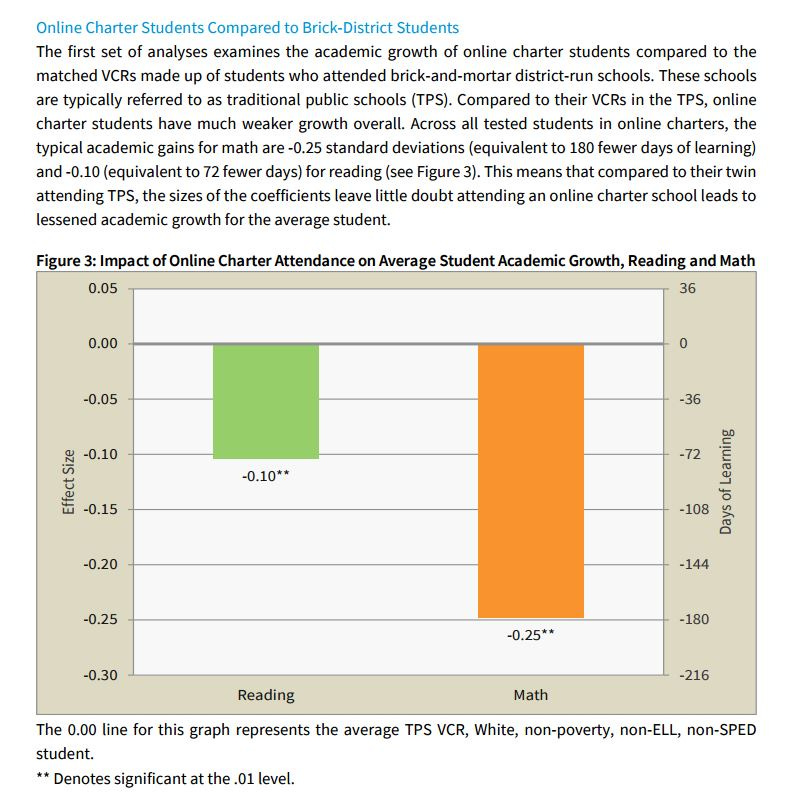Study of the Week: Of Course Virtual K-12 Schools Don't Work
This one seems kind of like shooting fish in a barrel, but given that "technology will solve our educational problems" is holy writ among the Davos crowd no matter what the evidence, I suppose this is worth doing.
Few people would ever come out and say this, but central to assumptions about educational technology is that human teachers are an inefficiency to be removed from the system by whatever means possible. Right now, not even the most credulous Davos type, nor the most shameless ed tech profiteer, is making the case for fully automated AI-based instruction. But attempts to dramatically increase the number of students that you can force through the capitalist pipeline at low cost that you can help nurture and grow are well under way, typically by using digital systems to let one teacher teach more students than you'd see in a brick-and-mortar classroom. This also cuts down on the costs of facilities, which give kids a safe and engaging place to go every day but which are expensive. So you build a virtual platform, policy types use words like "innovation" and "disrupt," and for-profit entities start sucking up public money with vague promises of deliverance-through-digital-technology. Kids and parents get "choice," which the ed reform movement has successfully branded as a good thing even though at scale school choice has not been demonstrated to have any meaningful relationship to improved outcomes at all.
Today's Study of the Week, from a couple years ago, takes a look at whether these virtual K-12 schools actually, you know, work. It's a part of the CREDO project. I have a number of issues, methodological and political, with the CREDO program generally, but I still think this is high-quality data. It's a large data set that compares the outcomes of students in traditional public schools, brick and mortar charters, and virtual charters. The study uses a matched data method - in simple terms, comparing students from the different "conditions" who match on a variety of demographic and educational metrics in order to attempt to control construct-irrelevant variance. This can be help to ameliorate some of the problems with observational studies, but bear in mind that once again, this is not the same as a true randomized controlled trial. They had to do things this way because online charter seats are not assigned via lottery. (For the record, I do not trust the randomization effects of such lotteries because of the many ways in which they are gamed, but here that's not even an issue because there's no lottery at all.)
The matched variables, if you're curious:
• Grade level • Gender3 • Race/Ethnicity • Free or Reduced-Price Lunch Eligibility • English Language Learner Status • Special Education Status • Prior test score on state achievement test
So how well do online charters work? They don't. They don't work. Look at this.
Please note that, though these negative effect sizes may not seem that big to you, in a context where most attempted interventions are not statistically different than zero, they're remarkable. I invite you to look at the "days of learning lost" scale on the right of the graphic. There's only 180 days in the typical K-12 school year! This is educational malpractice. How could such a thing have been attempted with over 160,000 students without any solid evidence it could work? Because the constant, the-sky-is-falling crisis narrative in education has created a context where people believe they are entitled to try anything, so long as their intentions are good. Crisis narratives undermine checks and balances and the natural skepticism that we should ordinarily apply to the interests of young children and to public expenditure. So you get millions of dollars spent on online charter schools that leave students a full school year behind their peers.
Are policy types still going full speed ahead, working to send more and more students - and more and more public dollars - into these failed, broken online schools? Of course. Educational technology and the ed reform movement writ large cannot fail, they can only be failed, and nothing as trivial as reality is going to stand in the way.


